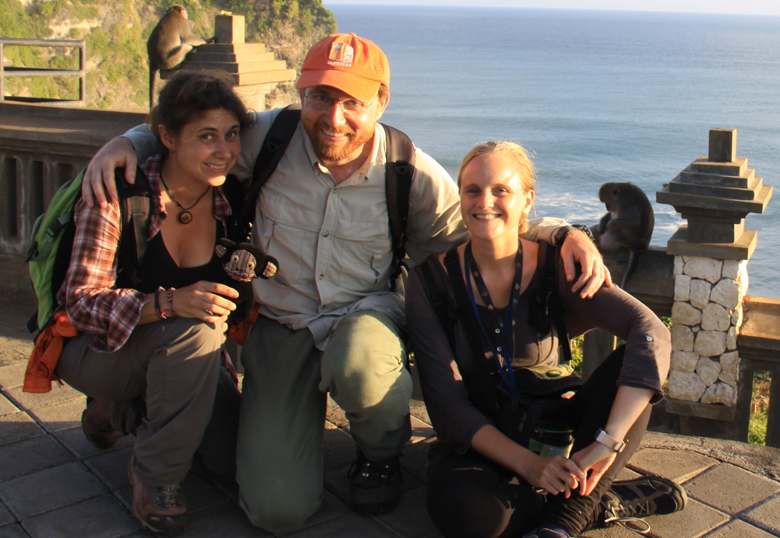University of Lethbridge researcher Dr. Jean-Baptiste Leca has his eye on some criminal activity but he’s not about to put a stop to it – not just yet.
Leca, an assistant professor in the U of L’s Department of Psychology, is engaged in a study that is examining a unique population of Balinese long-tailed macaque monkeys who steal objects from tourists and then use them to barter for what they really want – food.

“It can be quite funny but it has a controversial aspect to it too because some tourists complain that they have had jewelry stolen and sometimes they don’t get it back,” says Leca, whose research team, including research associate Dr. Noëlle Gunst, post-doctoral fellow Dr. Fany Brotcorne, as well as research assistants Anna Holzner and Lucía Jorge Sales, has traveled to the Uluwatu Temple in Bali to observe this unique phenomenon in collaboration with their primatologist counterpart, Dr. I Nengah Wandia of Udayana University.
“As researchers, we’re telling the staff if you ultimately want to stop this practice because it is bad for your temple, we have to better understand it first. So, you better let us work a little bit more to understand it fully and then we’ll help you gradually get rid of it,” he says.
Tourists to the temple have been at the mercy of the macaques for more than 20 years, meaning the behaviour is trans-generational and almost certainly cultural.
“The token exchange paradigm has been studied in captive settings for several years and it works in capuchin monkeys and chimpanzees,” says Leca, who is funded by the Natural Sciences and Engineering Research Council of Canada (NSERC) and the Dean’s Office of the Faculty of Arts & Science. “We know that non-human primates understand something about exchanging a non-edible object against food. In captivity it’s very well controlled but somewhat artificial because human experimenters train the monkeys to do that.”
“What we have in Bali is an open-field lab with monkeys daily training themselves. We’re not exactly sure how the behaviour originated. It could have been some human influence but the way it has spread is most likely cultural.”
Leca says the entire interaction is a fascinating case study of non-human personality and offers insight into the complex psychology of the macaques.
“It takes boldness during the robbing part, because it requires physical contact with a human, and not all monkeys are willing to do that,” says Leca. “Then it takes patience and self-control during the bartering part. With a very skilled monkey, it works, but for monkeys that are learning and impatient, the bartering part can be very messy. If the token is damaged by a young and impulsive monkey, the exchange may not even occur.”
The actual acts of thievery are quite brazen. A macaque will literally take a set of sunglasses off the face of a tourist, then retreat to wait for a negotiation to begin.
“Some monkeys are very good at raising the bar, they won’t exchange a particularly valuable item for anything,” says Leca. “Some monkeys seem to go with quantity, only dropping the object for several food items, while others will go for quality and physically reject, with an arm movement, a series of food items before they get the one they are interested in acquiring.”
The most skilled monkeys will get what they want, drop their stolen token and be on their way. The object, and the human victim, are left unharmed.
“In this population, the monkeys are not violent or aggressive towards humans,” says Leca. “They interact physically but you’d be surprised how skilled they are at snatching things like eyeglasses with not even a scratch.”
He says that monkeys do not become completely skilled in the practice before becoming sub-adults, meaning it could take them five to seven years to fully master the robbing and bartering aspects of the exchange. What he intends to learn from this is more about the difference in personality traits between individual macaques, how the system is passed on culturally, and eventually a glimpse at how this might unlock secrets to behavioural economics.
“It’s only the beginning of this work so we want to be very cautious, but ultimately we’d like our research to have implications for behavioural economics,” he says. “We’re possibly looking at decision making in an economic context, things such as gambling.”
Leca and his team of researchers were recently filmed by the BBC Natural History Unit and featured on an episode of PBS-Nature: https://www.youtube.com/watch?v=8q1MyVUze8M&list=PL5A4nPQbUF8Djx2pIKIMpK2gaIkns4YXA&index=19.
As well, the research has been featured in a PBS LearningMedia platform: http://www.pbslearningmedia.org/resource/nat16.sci.lisci.macaque/learned-behavior-and-culture-in-thieving-macaque-monkeys/ .
